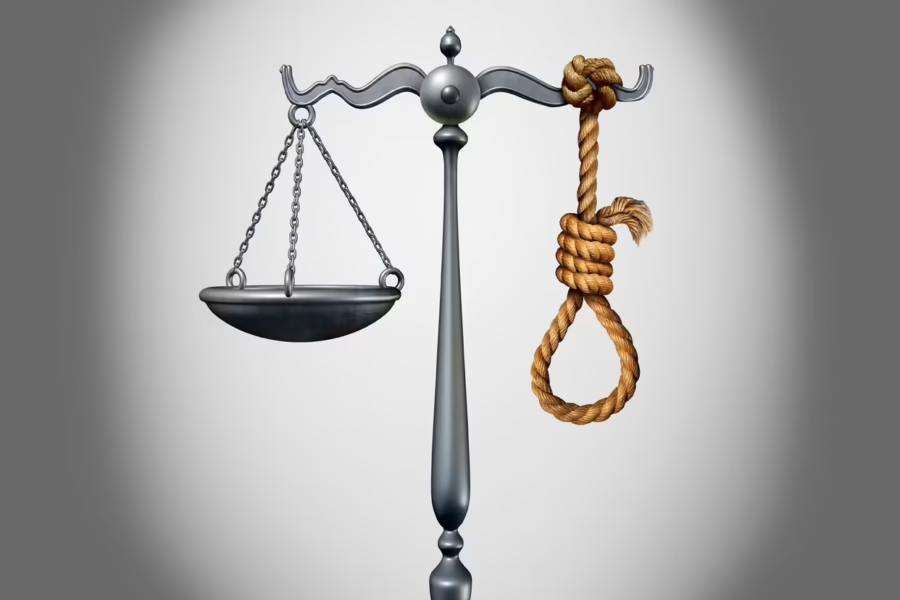Introduction
The death penalty remains one of the most divisive issues in modern society, igniting moral, legal, and practical controversies. Proponents argue it is a just response to the most heinous crimes; opponents highlight its capacity for irreversible mistakes and systemic injustices. This debate plays out on both domestic and international stages, influenced by shifting laws, political dynamics, and evolving human rights norms.
1. Legal Foundations and Safeguards
Retribution and “Rarest of Rare” (India)
Supporters of capital punishment in many countries maintain that those who take a life forfeit their own right to life a principle grounded in retributive justice. Britannica explains that proponents view it as morally justified retribution, reflecting society’s indignation toward grave crimes
In India, the Supreme Court has coined the “rarest of rare” doctrine, allowing the death penalty only in cases of extraordinary gravity. Courts must carefully balance aggravating versus mitigating factors, and sentences must be confirmed by a higher court, alongside providing a chance for mercy or clemency This framework is India’s attempt to reconcile legal validity with the irreversible nature of the death penalty.
Procedural Flaws and the Risk of Error
Opponents challenge whether any legal system can reliably avoid arbitrary or unjust executions. Capital cases often involve socioeconomic and racial disparities where marginalized individuals have reduced access to quality defense and face systemic bias
Moreover, human error and flawed evidence have led to wrongful convictions. For example, around 20% of death-row exonerations in the U.S. involved murder cases overturned on appeal The irreversibility of execution underscores the severity of such miscarriages of justice.
2. Ethical and Moral Considerations
Violation of Human Dignity
Critics argue that state-sanctioned killing inherently conflicts with the inviolability of human life and dignified treatment. Abolitionist positions from figures like Cesare Beccaria to modern religious leaders frame capital punishment as morally disproportionate and dehumanizing Pope Francis notably declared that the death penalty is “inadmissible,” asserting that it serves vengeance rather than justice and violates human dignity
Deterrence and Utilitarian Claims
A commonly cited utilitarian argument posits that the death penalty deters violent crimes more effectively than alternatives. However, empirical studies largely refute this claim. Britannica reports that research does not substantiate a superior deterrent effect for executions versus life imprisonment More broadly, legal commentators and international institutions echo this skepticism there is scant evidence that capital punishment reduces homicide rates
3. Global Trends and Normative Shifts
Worldwide Movement Towards Abolition
A growing international consensus views the death penalty as incompatible with human rights. Over two-thirds of countries have abolished it de jure or de facto, with abolitionist momentum grounded in treaties like Protocols 6 and 13 of the European Convention on Human Rights and UN instruments
In Europe, all member states except Belarus have abolished capital punishment. Russia maintains only a moratorium, with no executions since the 1990s. In Malawi, the Supreme Court ruled the death penalty unconstitutional in 2021, mandating resentencing of death-row inmates. In Malaysia, the 2023 Abolition of Mandatory Death Penalty Act received international commendation as a step toward complete abolition
Globally, Amnesty International reported that executions peaked in 2024 to a 10-year high, largely due to spikes in Iran, Iraq, and Saudi Arabia while the U.S. carried out 25 executions, a decade high, even as abolitionist sentiment grows elsewhere
4. The U.S. Context: A Polarized Approach
Resurgence of Executions and Federal Push
In the U.S., capital punishment is tethered to political leadership. Florida, under Governor Ron DeSantis, recorded a resurgence of executions in 2025 nine so far contributing to a projected national total that may surpass the previous decade’s norms One notable case involved Curtis Windom, Florida’s 11th execution of the year, despite pleas highlighting his mental health issues
Meanwhile, at the federal level, President Trump has sought aggressive expansion of capital punishment in certain jurisdictions, including Washington, D.C., defying local history and constitutional precedent However, judicial resistance has stalled many of these efforts courts have blocked reversal of prior death penalty decisions in nearly all contested cases
Decline Under the Biden Administration
Conversely, under President Biden, federal executions have dropped sharply. He commuted nearly all federal death sentences, leaving only three men on federal death row a marked shift from previous trends. At the state level, California saw its death row population fall below 600 in 2024, with no executions carried out a stark indicator of waning capital punishment use
Conclusion: A Balanced Appraisal
The death penalty debate remains deeply divided, anchored in conflicting legal philosophies and ethical convictions. Supporters claim retribution, deterrence, and societal protection justify its retention; critics emphasize the risk of irreversible error, systemic bias, and the violation of human dignity. Internationally, abolitionist momentum continues to gain ground, although authoritarian regimes and some U.S. states resist this trend.
Ultimately, whether society embraces or rejects capital punishment depends on how much weight is assigned to moral imperatives over perceived justice, and whether legal systems can or cannot eliminate bias, error, and arbitrariness in capital cases
CONTRIBUTED BY : ANSHU (INTERN )

